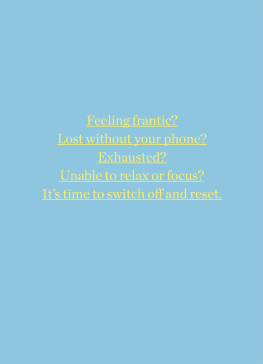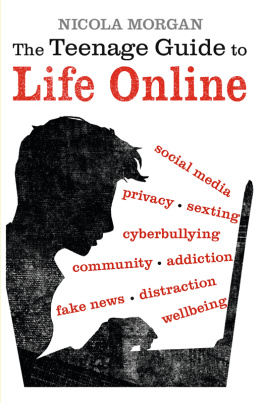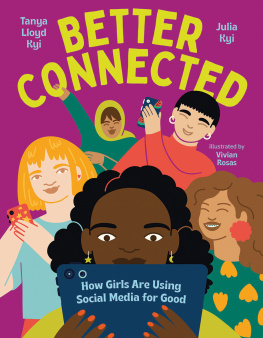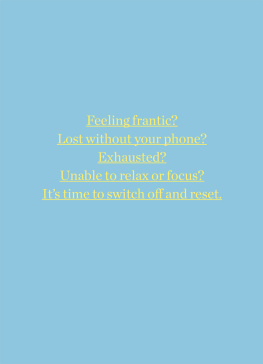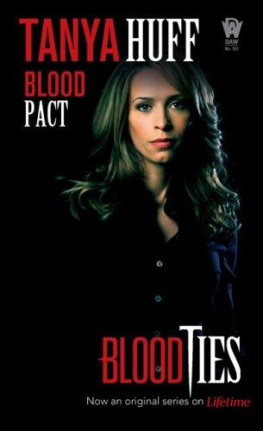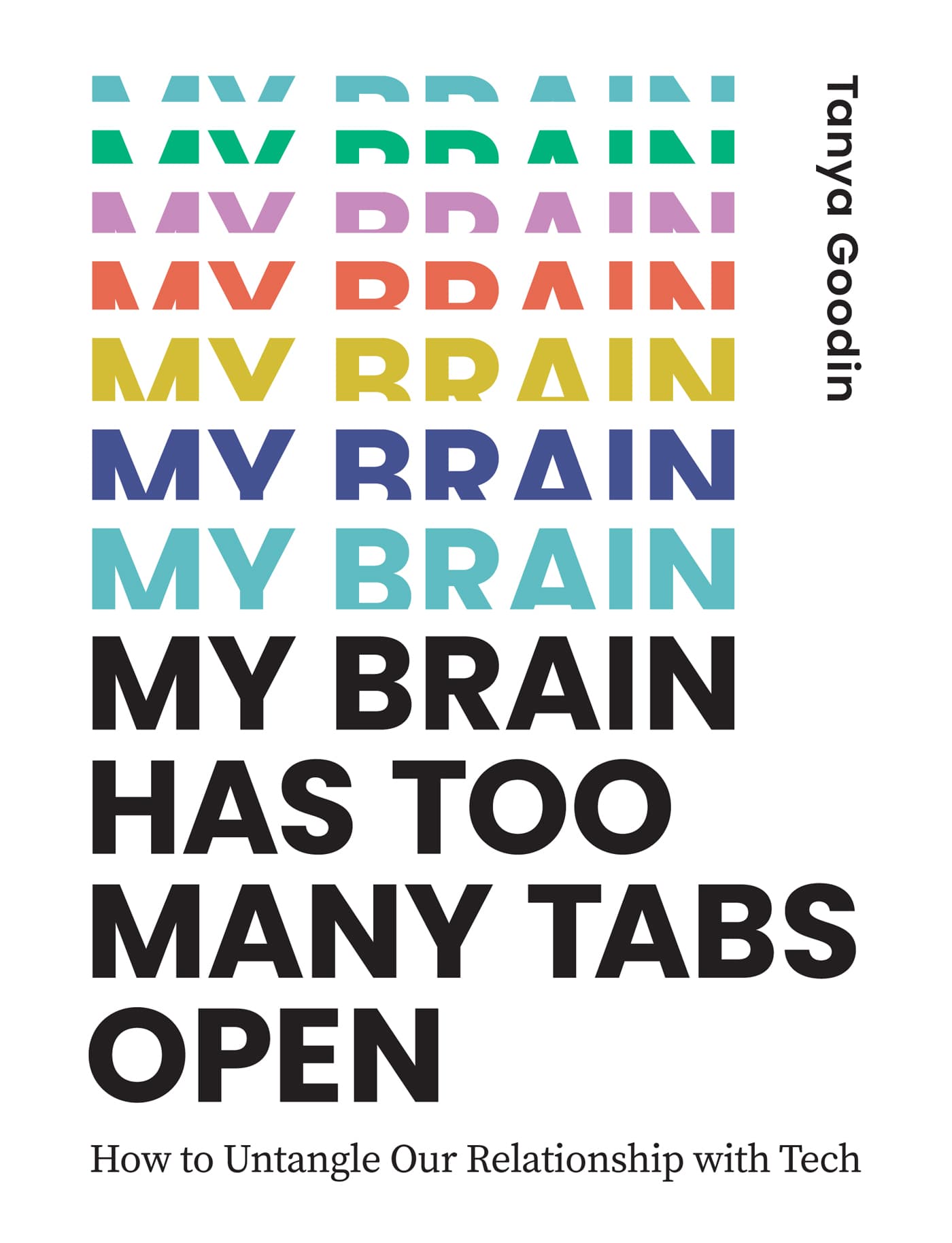Contents
Page List
Guide
Cover
MY BRAIN
HAS TOO
MANY TABS
OPEN
How to Untangle Our Relationship with Tech
Tanya Goodin
Contents
Stories about what our tech habits are doing to our relationships
Its like shes in a bubble
That one text decimated the family
He believes all this stuff
The loneliness is like an ache
He embarrasses me
There are three of us in this relationship
Someone is pretending to be you
Like visiting a place we used to hang out
Stories about how our tech habits affect our daily lives
Just ignore it
My brain has too many tabs open
Hes thrown everything away
No one wants to listen to you
It doesnt feel like real money
Its dominating our lives
*@%&!
Doctors are so busy
Stories about what our tech habits are doing to our work and our brains
I get all my best ideas after midnight
Like falling down a rabbit hole
Hashtags are so lazy
What if someone needs me?
Who ARE all these people?
Youre on mute!
EPILOGUE:
INTRODUCTION
I ts 1992. I am an imposter. The only woman sat in the middle of 30 men, spellbound in a dark meeting room at the Dorchester Hotel in London. A tall, thin fellow in a black polo neck is extolling the virtues of his new computer. Afterwards I share a cup of coffee with him. His presence is electric. I feel as though Im being persuaded to join a cult. I have been an Apple fangirl ever since.
The seed that was planted during that encounter with Steve Jobs inspired me to start my own digital business in 1995. It was one of the very first in the UK, and one of very few run by a woman. Tim Berners-Lee, who starred in the London 2012 Olympic opening ceremony live tweeting the words This Is For Everyone, had just released the World Wide Web code, which made the internet a public space accessible to everyone.
It enabled me to spend over 20 rollercoaster years at the forefront of the digital revolution. It was quite a ride.
Those early internet days were exhilarating. We were pioneers, part of the fastest technological revolution in history. Online life was simpler then. Early websites and content were either free or paid. When we paid, it was a transparent transaction where we each understood the price we were paying and exactly what the product was.
But then came social media and persuasive technology, ad tracking and data mining, disinformation and cybercrime. We surrendered our privacy, our data and our security to enthusiastically adopt this exciting new world, without giving it a second thought. We compromised the safety of our children and unquestioningly gave up our lives to stare dumbly at our smartphones. This new era was foisted upon us at such high speed, we are all still struggling to understand what just happened.
The Industrial Revolution triggered huge social, economic and political shifts that took several hundred years to fully work themselves out. Were still at the dawn of the Digital Revolution and we dont have that long to get it right. Big Tech are now the biggest and most powerful businesses on the planet. Four of the five most valuable companies in the world are tech companies. Four of the five richest men in the world run them. And we have allowed them to write their own rules. What have we got out of this transaction? Persuasive tech has manipulated our behaviour, cybercrime has flourished in a regulatory vacuum, social media has rewarded those who speak instead of those who listen. No-one designed the digital world to produce these outcomes, but they are what a failure to think through the consequences and a Wild West attitude to policing have delivered.
We have to recapture the internets original promise and restore Tim Berners-Lees vision of an internet for all. We have to reclaim the technology that can be used for so much good, and regulate and restrict the monopolies that not only manipulate and track us around the internet, but also allow the darkest aspects of human nature to flourish online. By acknowledging the impacts of technology on every aspect of our daily lives, we can begin to understand, talk about and highlight those problematic experiences that are changing us. We each want to retain the incredible convenience and positive impacts of technology and social media, but instead of digital participation being a take it or leave it Faustian pact, we must acknowledge the consequences of our choices and take action in our digital lives. Now is the time to reclaim our digital town squares and make them work for all of us. In this book, I highlight the ways in which we can take back control and ensure that we understand the ways in which were being manipulated by Big Tech, as well as offering the tools to resist and change this for good.
I will always be a technophile, an early adopter, a bit of a geek. But the issues were wrestling with today are not what I signed up for when I launched that pioneering digital business in 1995 or snapped up my first smartphone in 2007. Since 2012, it has been my mission to help individuals and businesses find a path through this unfamiliar uncharted territory. Just as I was one of the first to sign up to the promise of the digital world and see its potential, I was also among the first to flag its newly distorted state, raising the warning cry about the possible dangers and founding Time To Log Off, the global digital wellbeing movement.
Some of the answers are simple and easy. Many are not. Change will only happen if we, as users, insist on it. We need technology that works for everyone, not just billionaire Big Tech owners and the mafia prospering on the Dark Web. Im optimistic and hopeful that we can get the digital ecosystem we deserve, but if we dont want our generation to be the collateral damage of this incredible Digital Revolution, we need to speak up now and start applying real pressure.
Theres an important part we can all play, without waiting for changes from Big Tech. It starts with each of us taking a look at ourselves and the part were playing in the digital worlds problems. The internet shows us at our best, and at our worst. Making sure its the former is what this book is all about.
Are you with me?
Tanya
HOW TO USE THIS BOOK
Theres no right or wrong way to read this book. You can jump right in at the page that focuses on a digital dilemma youre struggling with and take it from there. But if you want to get the most out of this book, work through the three chapters in order so that you dont miss something that will help you to understand and resolve dilemmas impacting you or your loved ones. The chapters correspond with the main areas of our lives where our relationship with the digital world affects us the most. Loving is for everything to do with our relationships; Learning is for our life at work and in education (formal or otherwise); and Living is on our lives outside work.
Within each section, youll discover a selection of stories about real people Ive met and helped to improve their relationship with the digital world. In some cases, names and details have been changed to protect contributors identities. With each dilemma, I break down the issue both for the person and for what it means for all of us, and offer practical steps you too can take if you find yourself similarly affected. From singletons looking for love or young talents climbing the career ladder, through to the lonely, disillusioned or addicted friends, children, partners, families, everyone is included because we are all struggling with something in our relationship with technology. All manner of digital life is contained within these pages.


